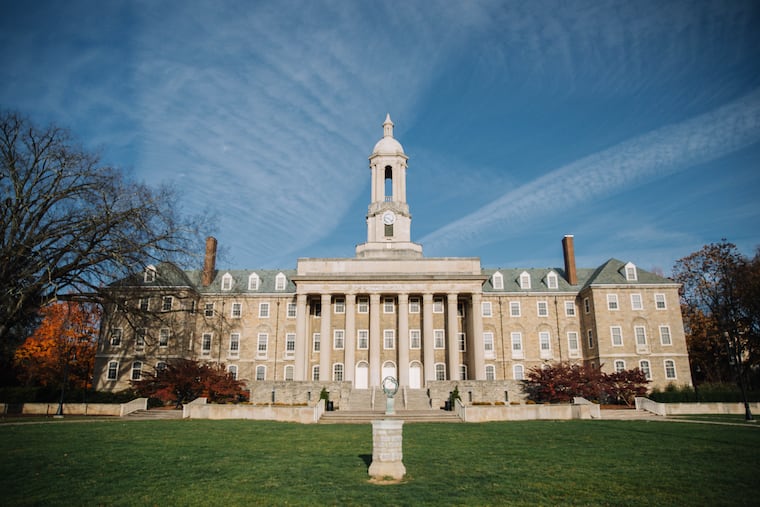Some Penn State faculty want to unionize as the university considers campus closures
It comes as concern builds over the closure of some Commonwealth campuses and budget issues.

Pennsylvania State University stands as the only state-related school without a faculty union, and now some faculty there want to change that.
Faculty concern about the university’s decisions began to accelerate during the pandemic and have continued to mount as the administration makes budget cuts and prepares to close some of its Commonwealth campuses, faculty say. A seeming lack of shared governance, salary and workload inequities across campuses, and transparency are among other concerns cited by faculty involved in the effort.
A website has gone up, with the group calling itself the Penn State Faculty Alliance and announcing an affiliation with the Service Employees International Union.
» READ MORE: Penn State plans to close some Commonwealth campuses
“We believe in a just, effectively run university that respects and values all faculty,” the group states on its website. “This is achieved through a strong, democratic, member-led union that gives Penn State faculty members at every campus a much-needed voice and an active role in decision-making.”
The group is gathering signatures ― it needs 30% of eligible faculty to sign on ― and intends to submit an application to the Pennsylvania Department of Labor. Penn State campuses employ more than 7,800 faculty.
If the signatures are secured, an election vote would follow. And if approved by a majority, a union would be formed. Graduate student workers also are attempting to form a union and have already filed with the labor department, but there is disagreement over the inclusion of research assistants and that means a hearing process is likely.
The three other state-related universities in Pennsylvania ― Temple, the University of Pittsburgh, and Lincoln ― already have faculty unions. Temple’s has existed for more than 50 years and its graduate student workers have been unionized for nearly 25 years. Lincoln’s formed in 1972. Pitt’s is more recent. It was established in 2021.
Faculty at Rutgers, New Jersey’s flagship university, are unionized, too. So are the 10 universities in the Pennsylvania State System of Higher Education.
» READ MORE: Penn State aims to grow University Park enrollment as population at other campuses wanes
The Penn State administration in a statement said it was aware of the unionization efforts.
“We respect the rights of our employees to share their opinions on this issue,” the school said. “We greatly value the teaching, research and service work of all our faculty members and are committed to an open and respectful dialogue.”
Unrest has been growing among some faculty as the university makes cuts to close a deficit by this summer. An attempt to hold a vote of no confidence in Penn State president Neeli Bendapudi was tabled at a faculty senate meeting last week.
Also at that meeting. Bendapudi laid out plans to close some of the Commonwealth campuses. Just how many campuses is uncertain, but none will close before the end of the 2026-27 year. Twelve of the 20 campuses ― Beaver, DuBois, Fayette, Greater Allegheny, Hazleton, Mont Alto, New Kensington, Schuylkill, Shenango, Scranton, Wilkes-Barre, and York ― are under consideration for closure. They will be evaluated by a team led by several top administrators appointed by Bendapudi; she expects to make a decision before commencement in May.
» READ MORE: At Penn State, 21% of eligible employees at its Commonwealth campuses took a buyout
At the faculty senate meeting, some faculty expressed concern that Bendapudi said she intended to make the decision on which campuses to close rather than rely on the university’s shared governance system.
“While I respect and value the role of shared governance, this particular decision … is an administrative one that I will make,” Bendapudi said in her announcement.
“This is again one more time that faculty and our consultation and advisory role has not been considered,” said Julio Palma, an associate professor of chemistry at Fayette in Western Pennsylvania, one of the campuses being considered for closure. “It’s just one more example that we actually need a union.”
Palma was the faculty member who made the motion to hold a no-confidence vote in Bendapudi at the meeting.
Problems existed even before Bendapudi, faculty said. Some faculty were concerned about the university’s decision to bring students back for in-person classes in fall 2020 and remain open even after coronavirus cases spiked. Some objected to the university not requiring the vaccine once it was available.
“That was a clear moment … when there was a complete disregard of the faculty, a complete disregard of the uncertainties and risks,” Palma said.
He said he joined faculty senate with the hope that faculty could have a stronger voice in decision making, but found that it’s not enough. He intends to continue to serve on that body and offer his opinions, but believes that a union is the only way to ensure adequate input, he said.
Faculty hope to secure better wages and benefits, job security protections, and a greater role in decision making. They want full and part-time, tenure, and non-tenure faculty to be included as members and believe all campuses would be involved except for the medical school faculty at Hershey, according to the group’s website.
“Over multiple administrations, we have experienced summary changes to our health care benefits and premiums, reorganizations of university structures, a hastily launched [voluntary separation agreements], new budget models and processes that have sown confusion and fear throughout our community, and an ‘othering’ of our Commonwealth campuses,” the alliance said on its website. “What we need instead is stability, transparency, and a guaranteed voice in shared decision-making.”